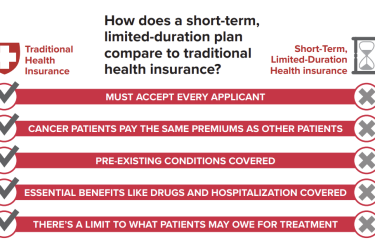
Don Berwick is a former administrator of the Centers for Medicare and Medicaid Services (CMS) under President Obama. Berwick’s long résumé includes leadership positions at the U.S. Preventive Services Task Force, the National Advisory Council of the Agency for Healthcare Research and Quality, the Institute of Medicine’s Governing Council, the IOM’s Global Health Board, and on President Clinton’s Advisory Commission on Consumer Protection and Quality in the Healthcare Industry. He is president emeritus of the Institute for Healthcare Improvement. He also teaches at Harvard Medical School and is on staff at several major Massachusetts hospitals.
Prior to his keynote address on social determinants of health at the recent Institute for Healthcare Improvement conference in Orlando, Fla., Berwick sat with me to talk about some of today’s most pressing health care issues. [This interview has been edited for clarity and length.]
Q: Medicare and Medicaid policies seem to be disappearing into a black hole. What can stakeholders do to ensure the people most at need – duals, the near poor, get the care and services they need?
A: It’s a dire problem. What’s happening is an erosion of supports, guarantees, diligence; making sure people who are really at risk and vulnerable and have a right to support are getting that support. When the federal government does its work, say through CMS, there are always three levels of activity going on: statutory; regulatory and sub-regulatory. The Republicans made repeated efforts to repeal the Affordable Care Act and that didn’t work. But that doesn’t mean the game is won or lost, because all the regulations have to be issued.
The latitude the administration is taking in interpreting the law and regulations is eroding it. And sub-regulatory is where the real damage gets done – whether you’re diligent or not in enforcing the regulation. What this administration has done, having lost the battle on statute, is weakening commitments in regulations, and it’s weakening diligence in sub-regulatory activities. An example is work requirements in Medicaid. That is regulatory, in allowing states to introduce them, which in my opinion is against the spirit and intent of the law, but it’s being allowed. Unless Congress acts directly – which it won’t – the agency can get away with it. Over and over again, we’re seeing activities at the regulatory and sub-regulatory levels that are eroding commitments.
Q: What, if anything, can cities and states do to make that up?
A: Unlike the federal government, cities and states can’t print money. By law, they can’t run deficits. Whatever they shift to support medical care access or social services is going to come out of some other pot. It’s a really hard circle to square. My own ethical position is that when there’s less to go around, we have to make sure that the first people we help are the most vulnerable – the poor, children, elderly, disabled, people who are marginalized. To me, that’s got to be the policy rule. In this vicious environment, we’ve got to do that. I think it calls on the private sector as well. This creates new duties in the commercial sector and the NGO sector. We have to make sure that the least among us are protected.
One of the most exciting things is this anchor institution model – Rush University in Chicago calls it their anchor mission – we’re here to help people in trouble. We have to think about everything we do, including our supply chain and contracting, how everything we do helps people in trouble and set some goals around that. We’ll spend our money where we can work on progressive income redistribution.
That’s the kind of locality-based, municipally-based, organizationally-based thinking that we need to bring to bear. Without an active federal government and a diligent Congress and a compassionate Congress, it’s very, very hard to do that, but we have to do our best right now.
Q: I want to quickly turn to drug pricing … what are your thoughts about drug reimportation and other ways to tackle high costs?
A: I favor drug reimportation. I’ve heard the FDA concerns and we need to listen to those, but we’re smart enough to come up with guardrails that would allow us to do reimportation. I think it would put the American pharmaceutical market under appropriate competitive pressures.
The argument is a free rider argument. It’s that somebody has to pay for research and development. And since they [pharma] don’t have an opportunity to cover those costs because other countries regulate prices, we’re the world’s supplier of innovation and money; that the extra money we’re spending is actually the engine of innovation. That’s not an argument I give much credence to. The argument isn’t so much that we should lower our prices but that the other countries should increase them. That’s not what I see.
Q: You have talked about the high price of even some basic drugs like Epipens and insulin. What can be done to make sure those who absolutely need these drugs can afford them?
A: Insulin, to me, is the poster child of this abuse. There was a recent JAMA article about the effect of price rises on patient’s ability to take the insulin they need and the outcomes. Twenty-five percent of patients have trouble affording insulin. It’s greed.
Unfortunately, these companies have a credo that says we will get any price we can get and where there’s no price regulation, no real market forces at work, even for generics, we will price as high as we possibly can.
What do you expect when there’s no limit on the price? It’s not like you’re buying a TV or a cable connection. You can’t say I’m just not going to buy it. Not if you’re a diabetic who needs insulin, or an arthritic who can’t move if you can’t get your arthritis medication. It’s extortion.
I don’t understand why the drug industry doesn’t police itself. They’re one of the most unpopular industries in America. The public has lost faith with many of the drug manufacturers. Not all the manufacturers are behaving badly; some are being more responsible.
Q: Does the government need to step in and start regulating prices, as they do in Europe?
A: It looks like it to me, at least or some things. If there’s a problem with supporting innovation, let’s take the innovation money out of the price and figure out a different way to support innovation. They’re begging for more regulation and price controls. And they do not have the public with them anymore. They can publish all the ads they want about “poor me,” or “innovation” but I don’t think this is a battle they’re going to win.
Remember you’re also a voter. I think we need a public movement centered on “if you think health care is a human right, then vote for people who say so.” If you believe that we’re in this together, then vote for people who believe in compassionate public policy.
Q: What can health reporters do to better highlight some of these issues? What are we missing and what should we be talking more about?
A: Overall, you’re doing a good job; it’s invaluable now to be able to explain, in terms people can understand, what is happening, what the underlying value system is that’s being represented. I guess you have to stay neutral, and you have to stay accurate; and when people are being hurt describe the harm. I think that’s very important. Stay diligent.
One of your colleagues I admire deeply is Noam Levy at the LA Times. He is an example of what constructive reporting looks like. He never cuts a corner, he does his research but he’s absolutely unafraid of saying “here’s the consequences of this” and explain why those consequences matter and don’t buy in to the rhetoric that isn’t true.
The other thing is that a lot of the reporting about international issues isn’t thorough enough. I still read reports about Canadians flocking to America because they can’t get care and that’s just wrong. Use the trustworthy sources – the Commonwealth Fund and Kaiser [Family Foundation] and draw on the people who actually do the international comparative work, because stuff is going on and other countries are struggling with these same problems. We can learn from them.
Liz Seegert’s travel to the IHI conference was partially supported by a journalism scholarship from the Institute for Healthcare Improvement. There was no obligation to report on any aspect of the event.









